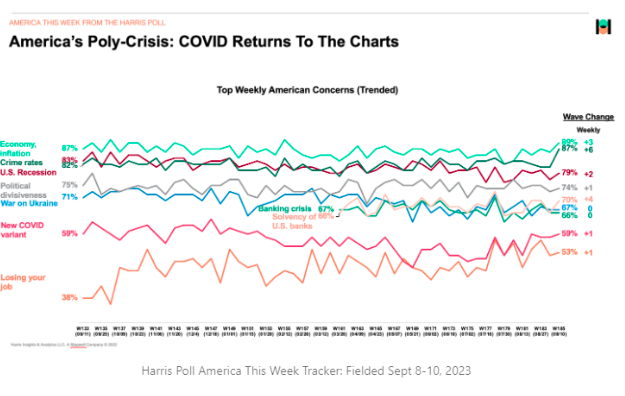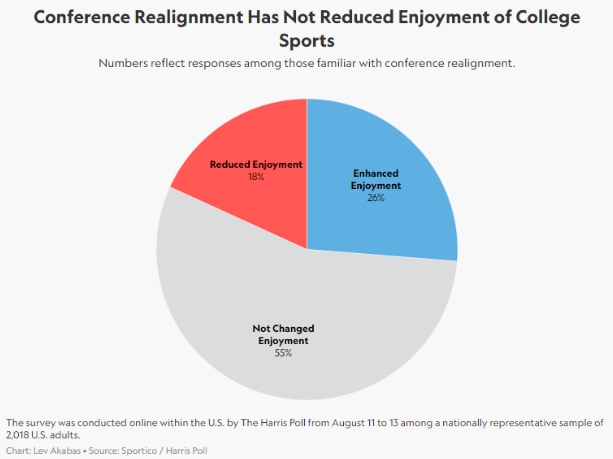Brief • 5 min Read
Employee Revolt on AI, EVs Are About to Motor, Removing AI Bias in Hiring, and College Football’s Super Conference Chaos.
The latest trends in society and culture from The Harris Poll
Good afternoon from New York. We’re hosting the second of our Risk and Reputation luncheons today with Corporate Communicators and Marketers. Our topic is ‘brand polarization’ and how to navigate your reputation through the divisive election season ahead.
In our America This Week survey, fielded September 8th to 10th among 2,076 Americans, worry persists over the economy and inflation (89%, +3%-pts from last week), affording my living expenses (74% +4%-pts), and even the solvency of U.S. banks (70%, +4%-pts).
Interestingly, public opinion has diverged from upbeat economists for months now. Today, eight in ten (79%) still fear a U.S. recession (-1%-pt), while Goldman Sachs has put the odds of a hard landing in ’24 at (15%), down from (20%) this year.
Why so glum? A simple theory is the poly-crisis, exhibited in the Harris chart below. At this point, people are so conditioned to macro-anxieties that they expect them to continue or keep resurfacing. (Case in point: Covid fears are up this week).

This week, four new Harris Polls of note:
- Don’t use AI to track me, employees say, in a Harris survey with the American Psychological Association.
- Are EVs about to reach a tipping point? We think so.
- According to our Harris Poll survey with the American Staffing Association, nearly half of Americans looking for a job worry AI is tipping the scales against them.
- And with college football underway, many fans are growing wary of realignment and super-conferences, in a new Harris Poll with Sportico.
You can download the new ATW monthly summary tabs and ppt deck here.
American Workers Call Out AI: American Psychological Association-Harris Poll
According to our new research with the American Psychological Association, employee worries abound about artificial intelligence and surveillance at work.
- While many employees are concerned about AI replacing their jobs – 38% of Americans say AI might make some or all of their job duties obsolete – even more are troubled by employers using AI to track them on the job.
- The majority (51%) of employees across different workplace settings said they were aware their employer uses technology to monitor them on the job, including office workers (49%), manual laborers (49%), and customer/client/patient services workers (55%).
- Work surveillance results in poor employee morale: Employees reported that technology tracking made them feel micromanaged (51%), uncomfortable (46%), and emotionally exhausted (39%) in the past month.
- And workers who reported being monitored believed they were not valued at work (26%) compared with workers who did not report being watched (17%).
Takeaway: “Employers interested in investing in artificial intelligence systems must also invest in their employees, educating them about the role of AI and providing opportunities for feedback,” said Arthur C. Evans Jr., Ph.D., APA’s CEO. “The workplace is changing rapidly. Open and honest communication from employers can help relieve employees’ anxieties about the unknown and improve overall well-being, associated with higher organizational performance.”
Are EV’s About To Motor? VinFast-Harris Poll
In new research with VinFast, gas vehicle drivers are ready to embrace electric vehicles and get on the road.
- While just 1 in 10 (9%) Americans currently drive an electric vehicle today, a staggering (54%) of gas-powered vehicle drivers would be interested in making an EV their next purchase or lease.
- Skipping gas costs is a big motivator: (62%) of drivers interested in purchasing or leasing an EV would do so to save money on gas.
- This could be especially helpful as our polling also found that (75%) of Americans expect gas prices to rise over the next few months.
- As is a general concern for the environment: (70%) of drivers agree that EVs are essential in creating a green future, and (58%) of drivers interested in purchasing/leasing an EV are motivated to do so to help the environment.
Takeaway: The move to EVs driven by concern about the environment shouldn’t be of too much surprise, as our America This Week tracker shows that over 7 in 10 Americans (71%) report concern about climate change, with 4 in 10 being very concerned. But also, the extended and revamped EV tax credit under the Inflation Reduction Act may also influence interest.
The Bias In AI: American Staffing Association-Harris Poll
Weeks after the Equal Employment Opportunity Commission released guidance on how to incorporate AI into a job search while still adhering to the Civil Rights Act of 1964 and the Americans with Disabilities Act, current job seekers aren’t convinced bias isn’t seeping into the search according to research with the American Staffing Association (ASA).
- Nearly half of employed U.S. job seekers (49%) believe artificial intelligence (AI) tools used in job recruiting are more biased than their human counterparts.
- Rules for thee, but not for me: At the same time, the study found that 2 in 5 (39%) current job seekers have used AI tools to assist in applying for a job.
- Usage varies based on race/ethnicity among U.S. residents, with (36%) of Hispanic and (34%) of Black U.S. adults saying they have used AI when applying for a job (v. White: 17%).
- Overall unease about AI and jobs has grown: Compared to six years ago, more U.S. workers agree that automation could easily replace their jobs (47% v. 2017: 27%).
Takeaway: “Job seekers may feel comfortable using artificial intelligence tools in their job search, but that does not equate to trusting AI to make fair hiring decisions,” said ASA CEO Richard Wahlquist. “As AI tools become more widely deployed, it’s critical that hiring managers work to increase transparency and accountability in their hiring processes and use tools that meet current and emerging anti bias standards.”
Is Conference Realignment Bad For College Football: Sportico-Harris Poll
With the latest conference realignment hollowing out the Pac-12 (It’s the Pac 2 now with Oregon State and Washington State), our new research with Sportico finds many Americans are ok for now but hold longer-term fears about the changes:
- Most (55%) U.S. adults familiar with conference realignment didn’t feel it impacted their enjoyment of college sports.

- However, more than two-thirds (68%) who follow college sports agreed that conference realignment is a problem in college sports – with over a quarter (27%) strongly agreeing.
- At the same time, (60%) agreed that college sports would be better off if the wealthier and more powerful conferences were spun off from the NCAA.
Takeaway: The prospect of emerging super conferences like the Big Ten and SEC separating from the rest of Division I has been a growing topic of conversation over the last several years. In 2020, the Knight Commission, the NCAA-friendly college athletics reform group, proposed the creation of a new governance entity funded by College Football Playoff revenues that would oversee all aspects of FBS football.
Subscribe for more Insights
Subscribe to our newsletter for the latest trends in business, politics, culture, and more.
Download the Data
This survey was conducted online within the U.S. by The Harris Poll from September 8th to 10th among a nationally representative sample of 2,076 U.S. adults.
Download
Subscribe for more Insights
Subscribe to our newsletter for the latest trends in business, politics, culture, and more.
Download the Data
This survey was conducted online within the U.S. by The Harris Poll from September 8th to 10th among a nationally representative sample of 2,076 U.S. adults.
DownloadRelated Content







